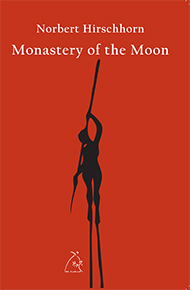Monastery of the Moon
Monastery of the Moon
Dar Al-Jadeed
Beirut, Lebanon
2012
76 pages, soft cover, 14cm x 21cm
ISBN 9953-11-04-9
Available from the poet.
Sample 1
QASEEDA – A LOVE SONG
(Neither homeland nor exile are words, but passions
of whiteness… If a poet were to compose a successful
poem describing an almond blossom, the fog would
rise from the hills, and the people would say: This is
it. These are the words of our national anthem.
—Mahmoud Darwish, ‘Almond Blossoms and Beyond’)
The Oasis Cafe opposite the departure gate -I sit,
laughing, crying with the same breath. If only I could
combine all whom I love into one. What I love in her
satisfies my desire. If instead I loved her desire, I’d
love her as myself. How long will you say no to me?
Stone falls on pitcher. Woe to pitcher. Pitcher falls
on stone. Woe to pitcher. No redress except at the
Post Restante of Time. Come now, beloved thief,
embezzle my heart. I sit at the Cafe, vacant, bereaved,
her eyes dimming in my mind, blue but now blurred.
I burn, something’s happened: dishes stacked, bed
made, a note on the kitchen table. Oh, to be held
before sleeping, again at false dawn. From the top
corner window of the Cecil Hotel where first we made
love, I see the harbour blue as Cleopatra’s lapis lazuli,
air blushed with coming of spring, as pubescent boys
polish Mother Egypt’s brass breasts under the statue
of Saad Zaghloul. Linen curtains shield the porthole,
distilling breeze through their fringes, relief for fevered
sleepers below. Something strokes me, if breath, if
hand. Solitary within our skins, whispers from prisoner
to prisoner, mirror facing mirror in an alabaster room,
a lit candle between. A sundered silk factory from Leb-
anon-stone, roof staved in, cedar beams strewn below.
Black crowned night herons devour the Ottoman moon.
Collapse the tents, leash the dogs, load up the animals,
round up the little ones, what reports from the border,
toss a rock into the pot. Nightjars chirr maniacally.
Memory embossed on granite, in soil: I remember
where I will be buried, amidst sage, mallow, thyme;
homesick for places unvisited, nostalgic for embraces
undreamed, reminiscence for what never happened.
The centre of the world where I stand, the world a
ladder: some go up, some come down. To recover
a word takes pain. Even martyrs love to walk the
Corniche at early dawn. A Palestinian son fishes
with his father, keeping the old man alive. Not his
land but that he cries to see the house he built,
draped in bougainvillea. Days of hope, days of loss.
Now comes rain: mollifying rain, consoling, baptizing;
dear Muse, let me waken to rain. I see rainbows
at night cast by the gibbous moon rising. A sabre-
toothed moon enfolds the morning star against a
breath-stop sky. One day, all the mirrors broke.
Everyone seized a sliver, peered and shouted,
It’s me, it’s me!
The Queen of Sheba, exhausted, scorned bouquets
of jasmine, necklaces of gardenias, anthems
to her entrance. She wanted an oiled bath, silk sheets,
nothing more. The muezzin calls the faithful to
prayer. Prayer better than sleep. Touch her shoulder,
respect her opinion, don’t be childish, wait for her.
She will be a ruby to your safekeeping, a diadem
watching over you. She will know what you are.
I enter her as into glorious mystery. The ginestra’s
vulval flowers cast their delicate odour in a crescendo.
I revel in your skin, smooth as a foal’s, your perfumed
hair, your eyes – extreme blue – nevi on rising breasts,
and how we fit one another. We dream in synchrony.
Dream spinner, dream weaver – the glass bowl when
rung makes a murmur of prayer, tree-frog’s glissando,
bees in lavender. At the Oasis Cafe someone asks,
where are you from? I reply, I am from disjointed frag-
ments of time. Someone says, Answer the question.
I answer, I am from you. Someone persists, but when
I’m gone? I say: / am from my words.
The Qaseeda is a lyrical poem from Arab and Persian traditions. One classical form comprises three sections, each conveying a different mood: a nostalgic nasib laments the loss of the beloved when encountering her deserted campsite; followed by the rahil, describing a material and metaphysical journey; culminating in the hikam, a moral resolution.
—Norbert Hirschhorn
Sample 2
DEIR EL QAMAR
Bone-white incense
glacial aroma of absence
chants strangled in the throat
Rising earth-light
blue angelic innocence
On the dark-side
the mad the maligned
the lost the possessed
